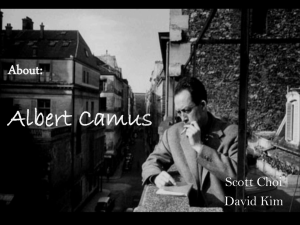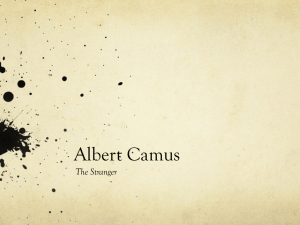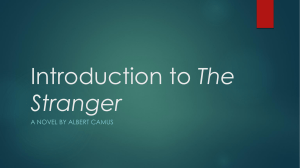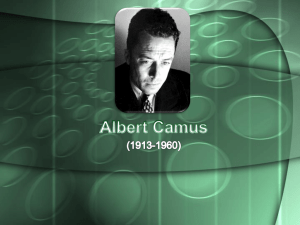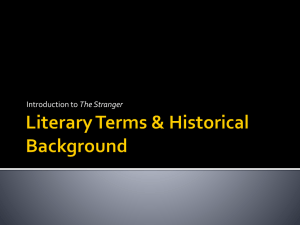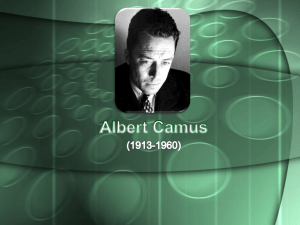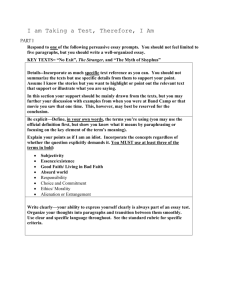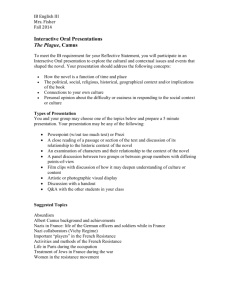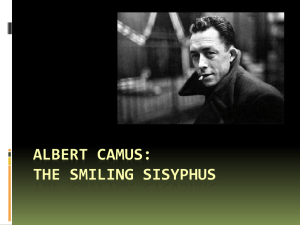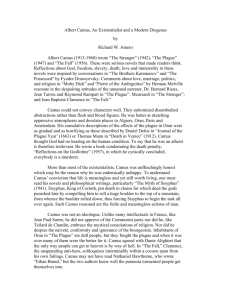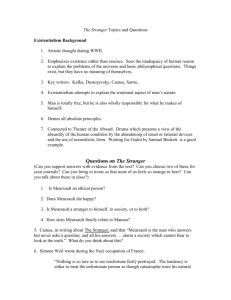who is camus? - AP English Literature and Composition
advertisement
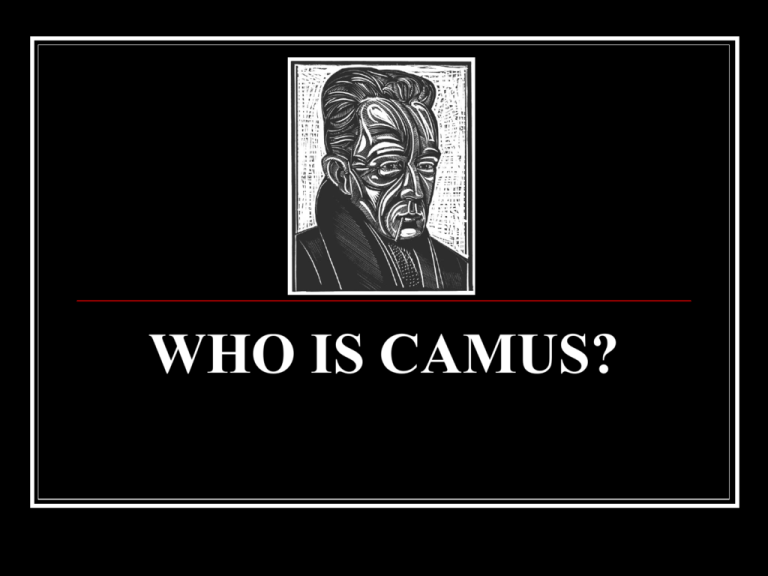
WHO IS CAMUS? Camus was born in Algeria in 1913 Camus’s Life His father died in WWI (1914) Camus never knew his father He grew up in poverty He contracted TB in high school (He gained a new perspective on life and death) WWII: He was editor of an Anti-Nazi newspaper He won the Nobel Prize in Literature (1957) He died in an auto accident (1960) Historical Background of Algeria 1942: Algeria was a colony of France (for over 100 years) Europeans invaded and confiscated land from the native Muslim population Thus, Algeria was a place of racial tension and economic unrest WWI and WWII had devastating effects on Algeria The Algerian people began to fight for independence (1954-1962) The Stranger The Stranger takes place in Algiers, Algeria It was originally written in French (1942) Many critics label Camus as an existential writer…but he refused to be labeled as such Camus says The Stranger depicts “the nakedness of man faced with the absurd” It begins with one of literature’s most infamous lines of all time… “Maman died today, or yesterday maybe, I don’t know…” --Meursault Is Fact Stranger Than Fiction? Does society expect people to be incredibly close with immediate family members? If so, why? Does society expect people to be incredibly emotional after a loved one dies? If so, why? The Mystery of Human Emotion Why are some people emotional and some not so much? Is emotional intelligence innate or learned? Consider the ways in which emotions could be both physiological and psychological in nature. Are emotional responses based on deep-seated belief systems and values, or are they innate impulses and knee-jerk reactions? WHAT IS EXISTENTIALISM? WE MAKE OURSELVES WE ARE RESPONSIBLE FOR OURSELVES THERE ARE NO EXCUSES EXISTENTIAL SPECTRUM _________________________________________________________________________________________________________________ NIHILISM TRANSCENDENTALISM Life is meaningless and absurd Everything is chaotic and random a reason No belief in God, fate, good or evil Everything is interconnected Everything happens for Belief in a higher purpose/power “Existence precedes essence” —Jean Paul Sartre Existentialism & Science: Neuroplasticity and Epigenetics The Myth of Sisyphus Camus was not a Pessimistic Existentialist! Camus believed that Sisyphus should roll his boulder with passion and that modern humans should cultivate happiness no matter how monotonous or meaningless life may seem… Camus and Religion Camus Hates Labels Camus studied religious thinkers and wrote his college thesis on Neo-Platonism and Christian metaphysics. Though he eventually came to the conclusion that he could not fully believe in God or any particular religion, he did not like the label “atheist” because he claimed he could not fully be certain that religious people were wrong either. Instead, he preferred the term “unbeliever,” meaning he was simply devoid of fervent religious beliefs. “You will never be happy if you continue to search for what happiness consists of. You will never live if you are looking for the meaning of life” –Camus Astrophysicist Neil Degrasse Tyson echoes Camus’s ideas… "The problem, often not discovered until late in life, is that when you look for things in life like love, meaning, motivation, it implies that they are sitting behind a tree or under a rock. The most successful people in life recognize that they create their own love, they manufacture their own meaning, and they generate their own motivation. For me, I am driven by two main philosophies: know more today that I knew yesterday, and lessen the suffering of others. You'd be surprised how far that gets you" What kind of existentialist are you? Do you believe in some form of life after death? Do you believe things happen for a reason? Do you believe that individuals are fated to play out a particular destiny or fulfill a specific life purpose? Do you believe in the intelligent design of the universe or a creator being? Do you believe that there is a higher purpose or reason for existence? Do you believe in a transcendent reality (or realities) other than the one we experience in the here and now? Do you believe that all things are interconnected? Do you believe in an objective Truth (capital “T”)? Do you believe in good and evil? Do you believe that life is inherently meaningful? Death Discussion Question #1 What are the social expectations for dealing with loss in our culture? How does our culture view death? How do we expect a person who is mourning to behave or react? What are the rituals and customs we follow to commemorate death? How do other cultures view death in comparison with our own? Death Discussion Question #2 How do you personally feel about death? What are your experiences with it? If you have ever experienced a great loss and/or known someone who was deeply grieving, please share how you coped. How did you feel and how did you handle the situation? If you have never experienced loss, it is inevitably something we will all encounter. Consider how you might react in a hypothetical situation or consider how you might help someone else who is grieving someday. “Death is the mother of beauty” --Wallace Stevens Top Five Life Regrets I wish I had the courage to live a life that was true to myself I wish I hadn’t worked so hard I wish I had the courage to express my feelings I wish I had stayed in touch with my friends I wish I had let myself be happier The End
